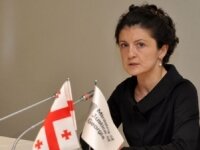PRESIDENT WILL BE INTERROGATED!
18 April, 2013
 Exclusive interview with Tea Tsulukiani, Minister of Justice
Exclusive interview with Tea Tsulukiani, Minister of JusticeTea Tsulukuani views the law on ‘Court Reform’ that is presumably to be enforced in the nearest future, as one of the main factors for restoration of justice. She talks about the Court, Prosecutor’s Office reforms and other important issues.
Q. – Is the Prosecutor’s Office becoming a body, independent from the Ministry of Justice?
A. – No. As it is written in the Constitution, general management of Prosecutor’s Office is implemented by the Minister of Justice and this will stand in force, but the Minister won’t be authorized to exercise criminal prosecution because a political figure can’t be a criminal prosecutor. After adoption of the law I won’t be authorized to interfere in the staff policy.
Q. – Impunity of previous authorities’ criminal high-ranks also causes people’s dissatisfaction.
A. – Cleansing and restoration of justice with regard to 9-year-long offences requires time. At the same time we have to keep in mind that final say belongs to the Court. As a result of the reform, the judges have a unique chance to hold a conference and by secret ballot elect worthy representatives to the Supreme Council of Justice.
Q. – If the new model of reform of Justice doesn’t justify itself?
A. – With the help of the new law we provide the judges with instruments to elect Supreme Council of Justice, the judge to become a self-ruled profession, as it is in the developed countries and to decide themselves who disgraces justice.
Q. – The issue of the reasons of 2008 war and Saakashvili’s possible interrogation became topical. The President declares that he won’t collaborate with investigation.
A. – Investigation of the August war is our international obligation. Georgia is a participant side and as a side we took certain responsibilities. Vast information is presented to the Hague Court and the Prosecutor in which citizens of different countries and NGOs claim that persons of different ethnicity and rank presumably committed different crimes to humanity or other offences that is qualified as war-time crime. Our obligation is not to make this a case for international trial but to look after our problems ourselves, within our competence. As for the interrogation of the President, in case facts of the case require this at a certain time, he will also be interrogated (by that time he may even not be the President), as well as many high-ranks.
Q. – The issue of the so-called ID cards is also very important. The ID’s of what form and content shall we have?
A. – With regard to this issue, personally I have the expectation of candid consultations with the Holy Synod.
Previous authorities tried to tie to the ID cards all the information connected with a person. Actually, every step made by a person would become known and that contradicts his free will. We aren’t planning this and are even pondering over legitimate guarantees against it because personal data and private life must be inviolable.
Q. – Is the Justice Ministry going to recommend the Parliament amendments to the law ‘On migration?
A. – The EU and other International Organizations, Agency of Development of State Services of Justice Ministry, actually, Secretariat of Migration Commission where all the offices meet on migration issues and make decisions render their help to us. The Premier is personally anxious about this issue and we have to timely offer a way-out.
Q. – The issue connected with the foreign citizens of developing countries, their unrestricted migration, free conditions for business, the mechanism of easy purchase of land, visa-free regime … are of special interest for our people.
A. – We have visa free entrance regime with more than a hundred countries but the same doesn’t take place with regard to our citizens. We’ll review this issue but it doesn’t pertain to the EU countries. If it meets the interest of our people and country, we’ll retain visa-free regime with other countries, otherwise this issue will have to be reconsidered.
Q. – As they say, you attended a conference on sexual minorities in Europe.
A. – Yes, together with the Ministers of 57 other countries I was invited by the Minister of Women’s Rights to visit Paris to exchange information. There were only women Ministers. We discussed the legislative situation and compared legislations of our countries, how this or that country regulates the issue of sexual minorities. Some countries admit marriage, others – don’t. When it comes to the children of such marriages, the law must give priority to supremacy of child’s interest. The issue of unisex marriage is a rather painful one. France will soon admit unisex marriage and while my being there this was followed by big protest actions. Let nobody think that these issues are painlessly discussed anywhere; countries don’t have identical approach to these issues. Whatever they have in common is that every person’s life and his rights make supreme values. It’s the same for me. Aggression and violence are unacceptable because of a person’s belonging to a sexual minority. In Georgia any new law connected with this issue must become a subject of broad discussions. It must be discussed with people, NGO sector.
Q. – Do you think cohabitation with the former authorities is possible?
A. – It’s difficult, sometimes – even impossible because the minority is busy with sabotage, not with building of democracy.
Q. – What could you say about ex-Minister of Justice Zurab Adeishvili?
A. – Hungary denied Adeishvili’s presence on its territory. Together with the Interior Ministry and the Prosecutor’s Office we are working on declaring international search. Only 6 months have passed since his flight. Truth always gains upper hand, so whether it takes six or ten months any way we’ll have him back. The main thing is to create an independent court, to give people the feeling of justice, insurance, healthcare, education and fair presidential elections.





















































